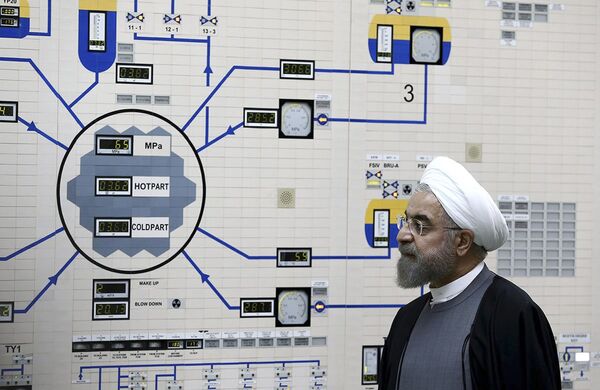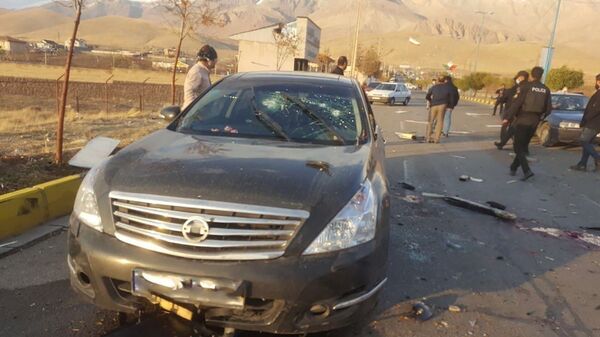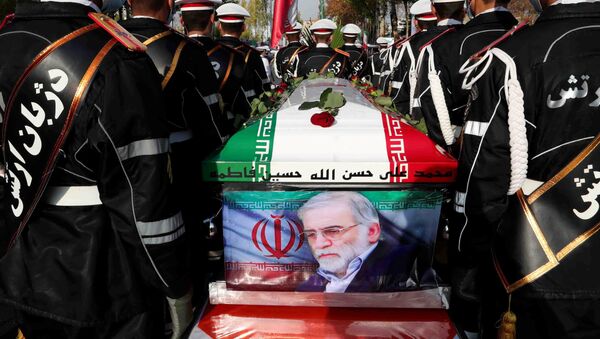The killing of nuclear scientist Mohsen Fakhrizadeh has led to a dramatic escalation of tensions in the already hostile relationship between Iran and Israel, with officials speaking to Israeli media praising the operation as a means to set back what Tel Aviv claims is Tehran’s covert nuclear weapons programme, while simultaneously fearing that the murder may lead to retaliatory attacks on embassies, a major missile strike, a ramping up of Iran’s nuclear programme, or attacks on Tel Aviv via ‘Iranian proxies’ on Israel’s borders.
Iranian and Israeli geopolitical observers are divided when it comes to the significance of Fakhrizadeh’s killing, but seem to agree on two things: that an Iranian response is inevitable, and that US President Donald Trump’s strategy of ‘Maximum Pressure’ against Iran has failed.
‘Sooner or Later, Iran Will Respond’
“I think Iran will retaliate, and the reason, the logic to retaliate is that these things can repeat,” says Dr. Foad Izadi, a professor of political communication at the University of Tehran. “There needs to be a cost for this type of activity, so next time they want to do something like this they also have to think about the cost.” The professor stresses that “when you engage in reckless terror activities, the other side will respond”.
Dr Izadi believes Iran’s retaliation is not a question of if, but when. “There are some people that argue that it should be done fast; they’re worried that if nothing is done, this could repeat before Trump is out of office; there are [also] some people who are saying that Iran should not respond fast, because they don’t want more escalation in the next month or so, while Trump is in office. These are different competing arguments, but I think sooner or later, Iran will respond.”
Professor Meir Litvak, director of the Alliance Centre for Iranian Studies and principal research fellow at the Dayan Centre for Middle Eastern Studies at Tel Aviv University, agrees, saying Iranian retaliation of some kind is inevitable.
“I am afraid that Iran will feel forced to retaliate, because of the humiliation and the blow. You can see it from the harsh calls for revenge, including [Iranian Supreme Leader Ali] Khamenei’s tweets,” Litvak says. “Which way will they retaliate? I don’t know. It will be risky for them to attack from Syria. Maybe they will attack Israeli embassies or offices in Asia or Africa, maybe they will try to kill Israeli scientists, or something similar.”
All relevant administrators must seriously place two crucial matters on their agendas: 1st to investigate this crime and firmly prosecute its perpetrators and its commanders, 2nd to continue the martyr’s scientific and technological efforts in all the sectors where he was active.
— Khamenei.ir (@khamenei_ir) November 28, 2020
Killing Won’t Stop Iran’s Nuclear Progress
The Israeli observer doesn’t believe Fakhrizadeh’s death will stop Iran’s nuclear progress, “because they have many scientists and the knowledge is there.” In fact, Litvak argues, “it may actually give Iran the excuse to rush forward with the nuclear development".
According to the Tehran University professor, Fakhrizadeh’s assassination is also “going to cause difficulties” for a potential Joe Biden administration, which had indicated that it would be interested in returning to the nuclear agreement.
“Iran looks at the situation, they put a lot of limitations on the nuclear programme and they got nothing out of it. They’ve got sanctions, more sanctions and then they’ve got scientists getting killed. It’s not logical for Iran to continue the process where the sides get benefits and Iran does not. It’s going to make the issue of reviving the nuclear agreement difficult. As I said, the bill that was passed by the Iranian parliament last night shows that people are unhappy with this process and thus they will change the process and that’s what we are seeing. Biden will have to work much harder to convince Iran to come in terms with what they have in mind,” Izadi says.

Just Who Was Dr. Fakhrizadeh?
Professor Izadi and Dr. Litvak are divided in their assessment of just who Mohsen Fakhrizadeh was, and his role in Iran’s (real or imagined) nuclear weapons ambitions. According to publicly available information, Fakhrizadeh was a professor of physics at Iran’s prestigious Imam Hussein University, a senior Atomic Energy Organisation of Iran scientist and a brigadier general in Iran’s Islamic Revolutionary Guard Corps specialising in missiles. However, Israeli officials have also alleged that he was also the head of a covert Iranian nuclear weapons programme.
Professor Litvak says Fakhrizadeh’s assassination “had two goals, one [being] to disrupt the continued Iranian effort to proceed with their drive toward nuclear capability, when it bec[came] clear that the Trump Maximum Pressure policy failed, and an Iran freed from the restrictions of the [Joint Comprehensive Plan of Action nuclear agreement] moved quicker toward nuclear capability. The other goal was to put Biden in a difficult situation of preventing him from going back to the JCPOA.”
Dr. Izadi has a different view, agreeing that ‘Maximum Pressure’ was a failure, but suggesting that the real reason for Fakhrizadeh’s murder was related to Israel’s desire to keep Iran from making technological progress of any kind, nuclear or otherwise. “So, if they find a good scientist and they have an ability to kill that person – they do that. They have a history of doing this, killing Egyptian scientists, Iraqi scientists, attacking their neighbours, and now Iran. This is not the first time, Fakhrizadeh was the fifth Iranian scientist assassinated by the Israelis. They want basically to cause difficulty in the progress that Iran is making.”

Izadi points out that the scientist was not just involved in Iran’s nuclear programme, but had also worked on the Defence Ministry’s efforts to try to curb the coronavirus pandemic.
The academic also says it’s worth mentioning that as far as the US, which he believes must have sanctioned the Fakhrizadeh hit, is concerned, the killing of Iranian scientists is not a Republican or Democrat issue, with both sides showing an easy willingness to take part in or approve such killings.
“This type of targeted killing that was very much done in line with the US policy of the Obama administration, something that we should remember. And generally, the Israelis would not engage in these activities unless they have a green light during the Obama administration. Biden is coming, so this is the whole team they used to have. That’s the basic reason – causing difficulties for Iran, sending this message to other scientists in Iran, that if you work hard, we are ready to come and get you, showing some level of strength in terms of being to attack Iranian scientists near Tehran,” Izadi concludes.


